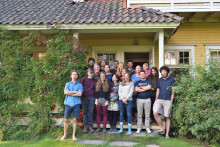
It’s a natural part of the female life cycle – so why don’t we talk more about the menopause, its debilitating effects and possible mitigation? Read the whole article here
The Guardian 26.8.2019 by Hannah Devlin
...
In terms of evolution, what’s the point of the menopause?
One of the most compelling evolutionary explanations for menopause is the “reproductive conflict hypothesis”. The idea is that when multiple generations live together in a patrilocal set up (that’s to say, a woman moving in with her husband’s parents), a woman would compete with her mother-in-law for the resources needed for babies and children if their reproductive schedules overlapped.
Research by Prof Virpi Lummaa, of the University of Turku in Finland, using a 200-year dataset on pre-industrial Finns, showed that simultaneous reproduction by daughters-in-law and mothers-in-law was linked to a far worse chance of children surviving.
The daughter-in-law is unrelated to the children of her mother-in-law, so – evolutionarily – has no motivation to contribute to their survival. For the mother-in-law there’s a trade-off as she has 25% of genes in common with her grandchildren. And so if at some point in ancient history a “menopause gene” emerged, it would carry the evolutionary advantage of boosting the chances of survival of grandchildren.
“Our modelling work showed that such costs of two women reproducing simultaneously in the same household were sufficient to generate selection against continued reproduction beyond 51 years,” Lummaa says.
It’s interesting to note that this evolutionary trade-off only happens when males continue to live with their families as adults. Lummaa’s team studied Asian elephants employed in timber camps in Myanmar and found that calves survived better if their grandmother was nearby. However, Asian elephants do not show a clear-cut menopause and have been observed to reproduce into their late 60s.
A crucial difference could be that elephants live in matriarchal herds, led by a dominant older female. So, thanks, prehistoric patriarchy.


